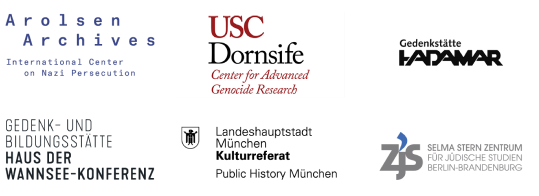Annotations
Gailingen
10/22/1940
Rosa Bloch and Isidor Merkel with luggage on their way to Gailingen town hall. In the background, a municipal police officer and an elderly man sitting on a chair watching the deportation can be seen.
Annotations
People
2
Keywords
1
Historical context
Deportation von Gailingen nach Gurs am 22.10.1940
On October 22, 1940, the last day of the Feast of Tabernacles (Sukkot), the municipal and security police deported more than 6,500 Jews from Baden and the region then known as Saar-Palatinate (German: Saarpfalz) to the Gurs internment camp in unoccupied southwestern France. One hundred and eighty-two people from Gailingen persecuted as Jews were arrested by the municipal police and had to present themselves at the town hall early in the morning within two hours with a maximum of 50 kg of luggage and 100 Reichsmark in cash.
The municipal police took them by truck to the Scheffelhalle assembly camp in Singen (Hohentwiel). In the evening, they had to board French passenger trains waiting at the Singen station. Via Mulhouse and Chalon-sur-Saône, they probably reached Oloron-Sainte-Marie in the Basses-Pyrénées department on October 25 or 26, 1940. They were taken to Gurs by truck. Starting in August 1942, the prisoners were deported to Auschwitz via the Drancy assembly camp near Paris.
Eight people from Gailingen survived the Shoah.
About the image series
Five black-and-white reproductions (four in landscape format, one in portrait format) measuring 8.5 x 11.5 cm and showing the deportation from Gailingen on October 22, 1940, have survived. The pictures show various different scenes that include Jews first being picked up at their places of (forced) residence, the Friedrichsheim (Jewish old age home) and the Israelitisches Krankenhaus (Jewish hospital), then walking with luggage to the Gailingen town hall, and finally boarding trucks. Bystanders and municipal police officers can be seen in almost all of the pictures. Five Jews and one nurse pictured are known by name.
The pictures were probably taken by the photo lab assistant Charlotte Schlenker, whose husband owned a photo store in Gailingen. It is probable that the town authorities commissioned her to take photos of the deportation.
Photographer
Charlotte Schlenker, Fotolaborantin
Charlotte Schlenker was the wife of the owner of a photo store in Gailingen. According to local historian Detlef Girres, she was a "staunch party member" and "convinced National Socialist". Berta "Berty" Friesländer-Bloch (1896-1993), who was deported from Gailingen to Gurs on October 22, 1940, with her husband and her three-year-old son, referred to her in her later writings as the "court photographer" of Willy Becher, the then mayor of Gailingen. Therefore it is probable that the town authorities commissioned Schlenker to take photos of the deportation.
Provenance
The four photos in landscape format are part of an official photo album of the town of Gailingen which the then town mayor Alois Sproll started creating in 1938 in memory of his predecessor in office. The album contains pictures of local party marches as well as a page titled “Juden-Aktion Oktober 1940” (Operation against Jews October 1940). The number “22.” was added in pencil later. After the end of the Second World War, several pictures were removed from the album and destroyed, including the pictures of the deportation.
The surviving pictures are reproductions belonging to Berta Friesländer-Bloch (1896-1993), who was deported to Gurs herself with her husband and son. Reproductions of the pictures have also been preserved thanks to Ezechiel Hasgall, who emigrated to Palestine with his family in 1936. They are now part of the holdings of the Leo Baeck Institute, New York, and of Hauptstaatsarchiv Stuttgart.
Call number at source archive
Title at source archive
Friedrichsheim 2
Acknowledgements
The description of the photos is based on research done by the Verein für jüdische Geschichte Gailingen e.V. (Association for Jewish history Gailingen). Sincere thanks are in particular due to Joachim Klose for patiently answering countless follow-up questions and for willingly sharing research results.
Text and research by Kerstin Hofmann.
Kooperationsverbund #LastSeen. Bilder der NS-Deportationen Dr. Alina Bothe Projektleiterin
c/o Selma Stern Zentrum für Jüdische Studien Berlin-Brandenburg
Freie Universität Berlin
Habelschwerdter Allee 34A
14195 Berlin
lastseen@zedat.fu-berlin.de
Ein Kooperationsprojekt von

Gefördert durch

Datenschutz | Impressum